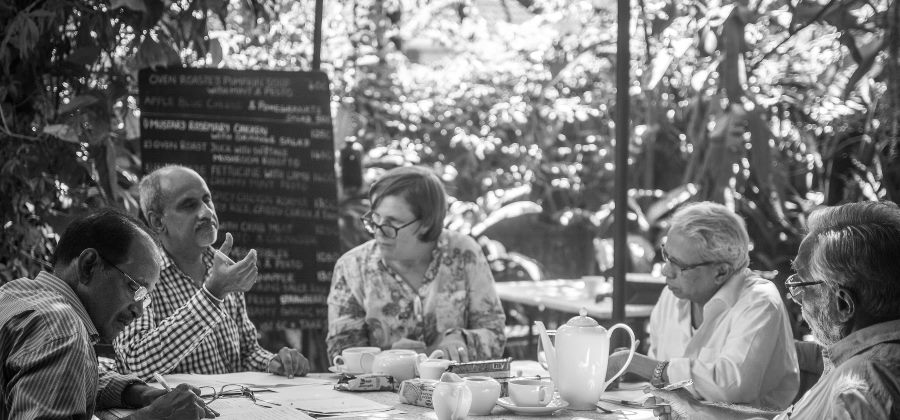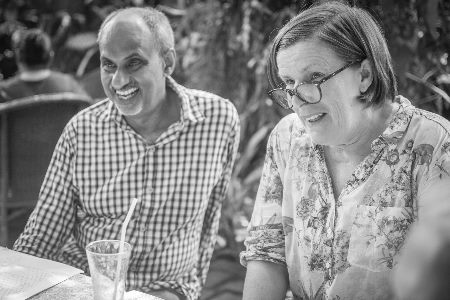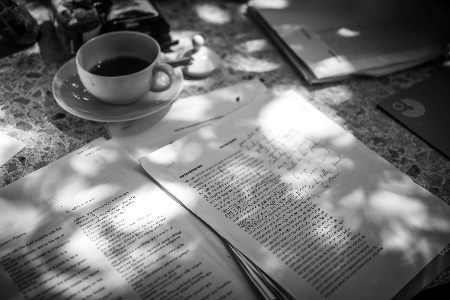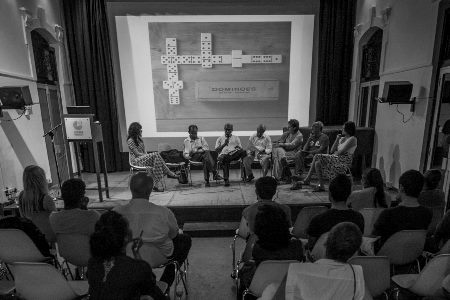Of Poetry, Power and Dominoes - Wordplay and Life

 Photo: Goethe-Institut / Natalie Soysa
Photo: Goethe-Institut / Natalie SoysaAround political maps and linguistic manipulations, a game of Dominoes was played to satisfaction. The Colombo Encounter, the fifth in the series of poetry workshops for Poets Translating Poets, faced a tackle or two.
a game with the eyes a game with the hands
the talk of gestures tied to the net of glances
Under a tree canopy a stone-topped table strewn with poems and possibilities ties together, three poets and three translators. German poet Barbara Köhler is furiously drawing Domino tiles on a white board, while explaining the rules of the game to her two counterparts – Sri Lankan poets – Ariyawansa ‘Ari’ Ranaweera and Somasundarapillai ‘Sopa’ Pathmanathan – while the interlinear translators Prof. Asoka de Zoysa, Nimka Udapola and Fr. Francis Jeyasegaram chip in with their inputs. They are translating Barabara’s poem, die dominospieler/ The Domino Players.
An enormous task, translation is also often a lonely and frustrating process. Dictionaries abound, the struggles with the language and grammar, of bringing forth the original author’s experiments – what theorist José Ortega Y Gasset calls the author’s “radical courage” – while being enslaved in the “controlling apparatus, composed of grammar and common usage” 1, are well documented. But this lone wolf experience is done away with when you bring 48 poets from 19 languages together over a year’s worth of translation workshops. Here, one’s singular struggle to translate and the pitfalls of being the master of it all, is transformed into a collective experience.
Hands flail in gestures that substitute linguistic understanding. Eyes sparkle brightly as the original meaning is beholden to the translator who decodes. Slowly, each poet negotiates with the other, constructs meanings in bits. From the process to the finish, from the parts to its sum, each poetry translation encounter of the mammoth Poets Translating Poets (PTP) project comes armed with its charms and chores.
the one who has nothing to add takes out of
a hope that doesn’t fade till the last piece is
played to find an answer a sign a sameness
a turn that continues the conversation that fits
into the ornament that perhaps becomes a
picture that then appears clearly in the middle
Barbara Köhler’s poetry is steeped in linguistic manipulations of the German language and was rather challenging to translate. She consistently uses lower case and avoids capital letters for nouns and at the start of sentences – a regular feature of written German. Devoid of punctuation marks, her poems can be read in multiple ways with words emerging in a different relation to each other as they are added on, combining into phrases and sentences. It’s ambiguous and multi-hued.
 Photo: Goethe-Institut / Natalie Soysa
Photo: Goethe-Institut / Natalie SoysaProf Asoka explains: “it could mean this or that.” As he wrote in an e-mail accompanying his pre-workshop interlinear translations of Barbara's poems: ‘... her ideas may not be exact, they may be chaotic. But it's beautiful within the chaos. We don't exactly know how to translate some of her lines. Her metaphors and ideas are all rolled into one.’ In interlinear translations, where one must translate word by word with multiple meanings for each word, Barbara’s interlinear translations are bereft of the sheer virtuosity of her writing.
Interestingly, Barbara agrees with the accusation. She is conscious of the ”difficult project” tag, but she can't help it. In her words, "she loves dealing inside of the language and with the language". She uses Gertrude Stein to explain, "I like the feeling of words doing what they want to do and as they have to do when they live as they have to live that is where they have come to live which of course they do do."
Fr Francis revealed his own challenges and discoveries, “As translator I faced some difficulties in finding Tamil idioms, literary forms and even certain language patterns transforming into corresponding German language. But through the process I could get into the cream or message of the poem; the soul of German way of thinking and living.” He also hoped that he was able offer the Germans a glimpse into the Tamils’ way of thinking and acting.
For her part, Barbara revelled in her own discoveries and choices within the process. She particularly enjoyed playing with the traditional structures and cadence of Ari’s poems. In some of Sopa’s poems, she chose to play with the original contexts and words such as murunga tree and raga. "It needn't be that everyone understands the poem. Using words from the original language gives a sense of place and somehow makes the poem less neutral."
This process uncovered newer challenges for the poets who were translating her poems. Painstakingly, each word, phrase, line, image, idea was sketched and uncovered. Questions were furiously exchanged, as the game continued.
at one of which two play not at war, not for
mastery or power the one who wins this game
is the one who can give everything who stays
awake who sees how sameness changes at
the same time the one who answers the other
at the table with the same sides and the
gestures the glances the glances the gestures 2
 Photo: Goethe-Institut / Natalie Soysa
Photo: Goethe-Institut / Natalie SoysaShe faced other challenges during the process – of understanding her own perspective of the culture she was about to decode. Words like xenophobia, gender differences, culture clash were bandied about not with potent accusation, but with genuine concern for her own baggage that she may be bringing to the table.
The Sri Lankan poets, on the other hand, took numerous sharp intakes of breath at the language structures with which the German poet was playing and bold existential questions she posed – so very different from the poets of the late 20th century they had read such as Rilke and Brecht. Compared to their own poems pregnant with emotion and passion, they found her poems to be rather cerebral and emerging from an intense power play with thought.
Power and play were invoked and engaged in frequently. Initially, the context was practical. The Sinhalese interlinear translators Asoka and Nimka were from Colombo, while Fr Francis had to travel from Jaffna to come for the workshop. He was called away during one of the days and Asoka took on the mantle to help discuss Sopa’s poem Thoughts on a Full Moon Day with Barbara. While the common cultural background helped, there were times where questions and suggestions emerged from a space that were beyond poetic, that were often trying to draw from the Sinhalese language and cultural interpretation of the poem. While translating these lines,
But one day the gods turned into demons
they pestered us who had asked for a homeland
and our homes were destroyed
Cultural theorist Gayatri Spivak once wrote that ‘Language is not everything. It is only a vital clue to where the self loses its boundaries’ 3. In a negotiated conversation that changed ‘homeland’ to ‘home’, the poem lost its boundaries. Power structures asserted themselves not just within the microstructures of negotiated dealings between the players, but also the macro structures of availability and penetration of the German language in Sri Lanka.
Nonetheless, power structures are not vacant inanimate constructions. They are very much built and broken down by people. And as some of the key active agents in this process, artists and writers have the power to influence power dynamics. At the Colombo PTP encounter, this was evidenced more than once. Both Ari and Sopa translated all of each others’ poems that were brought to the workshop and promised to translate 50 more poems from Tamil to Sinhalese and Sinhalese to Tamil, over the course of the next year using the interlinear translation method. Dr Petra Raymond, Head of Goethe-Instiut Colombo, was quite excited by the possibility and offered to partner in the process and the project.
 Photo: Goethe-Institut / Natalie Soysa
Photo: Goethe-Institut / Natalie SoysaPerhaps an apt articulation of the experience can only come from a participant. While addressing the audience at the public reading of the poems on the fifth day of the workshop, Fr Francis explained, “From the five-day programme I learnt that all the poets through their poems are trying to break barriers and bring down walls to bring the human family as close as possible. What I felt, through this encounter that we must learn to celebrate differences. We must learn to enjoy differences which are embedded in nature and creation,” he concluded. Amen to that!
References
- José Ortega y Gasset, “The Misery and the Splendor of Translation” (1937), trans. Elizabeth Gamble Miller. In Rainer Schulte and John Biguenet (eds) Theories of Translation: An Anthology of Essays from Dryden to Derrida, Chicago: University of Chicago Press, 1992, pp. 93–112. Copyright © 1992 by The University of Chicago.
- All three excerpts from: cor responde. Gedichte deutsch/portugiesisch. Gemeinsam mit Ueli Michel (fotos/farben). Publisher: pict. Im, Duisburg & Berlin, 1998. Translation: 2011, Donna Stonecipher
- Gayatri Spivak, “The Politics of Translation.” In Gayatri Spivak, Outside in the Teaching Machine, London and New York: Routledge, 1993.



